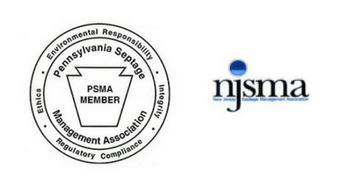Septic Inspections
Septic tank inspections are investments that provide real estate agents, potential homebuyers, and existing homeowners important information regarding their septic system. ATS Environmental employs experienced and PSMA certified inspectors that use the most advanced equipment and inspection methods available to provide you with fast and accurate results. Protect your health and the health of your family by investing in routine septic inspections with ATS Environmental.
Septic system inspections delivering accurate and unbiased results using:
- Experienced and certified septic inspection specialists.
- Digital cameras designed specifically for septic inspections. These are used to visually examine all important components of the septic system, including the conveyance lines.
- State of the art digital location equipment designed to find buried septic systems during the septic inspection, without the need to excavate.
- Reports which are available the business day following the inspection.
DO YOU NEED A CERTIFIED SEPTIC INSPECTION?
What is a Septic Tank Inspection?
A septic tank inspection is a thorough evaluation of your home’s (or potential home’s) septic tank system. A septic tank inspection may check for various abnormalities in the septic tank system or spot potential malfunctions of the system. Septic tank inspection specialists at ATS Environmental may ask that you present your septic tank permit, if you have it, to easily locate your tank and gather information about your system.
When Do I Need a Septic System Inspection?
A septic tank inspection is generally recommended at least every one to three years to assess the functionality of your septic system and catch any issues early. Systems that have pumps may require more frequent checks – at least one per year, if not more. Household septic tanks are typically pumped every three to five years.
Some factors that may influence how often you need a septic tank inspection include your household size, the amount of waste that your household generates, the volume of the solids in your wastewater, and the size of your septic tank. However, you may need a septic tank inspection if certain scenarios arise, such as if you notice a leak, your toilet is not draining properly, or the ground above your tank appears unnaturally wet or soggy.
Your septic tank has a T-shaped outlet that functions as a filter; it prevents sludge and scum from leaving the tank and draining into the drain field. You may need a septic pump if the bottom layer of sludge is within six inches of the bottom of the outlet, or if the top of the septic sludge layer is within 12 inches of the outlet.
Septic Tank Inspections: What to Expect
When you schedule a septic tank inspection with ATS Environmental, your septic tank inspector may ask you for more information regarding your septic tank, such as when it was installed. They may also ask if you have any maintenance records for your septic tank, are experiencing any septic leaks, or otherwise have any concerns regarding your septic system.
When a septic tank inspection specialist from ATS Environmental checks your septic tank system, they may:
- Locate your septic system and need to uncover holes to access your tank.
- Check the ground above your septic system for abnormal wetness, sogginess, which may be signs of improper draining, a leak, or a clog.
- Check your septic system effluent filter (while some septic systems will alarm you of when the filter needs to be cleaned, others might not).
- Check the functionality of your toilets by flushing them.
- Check for signs of sewage back-up.
- Check for leaks.
- Inspect the mechanical parts of your septic tank.
- Recommend that you clean or pump your septic tank.
If you know where your septic system is located, be sure to let your septic tank inspector know ahead of time. Also make sure to keep track of when you’ve had your septic tank pumped. While your inspector is checking your septic system, you may wish to write down any leaks or issues they come across to keep for your records
Our Open-Pit Septic Inspection Process
ATS Environmental’s septic inspection process may vary slightly based on the size of your home or other structure, when it was built, and other factors. ATS aims to provide customized and completely unbiased inspections to homebuyers and homeowners. Our general process is as follows:
1. Evaluation of septic components inside the home: ATS checks all appliances and associated pipes for proper connections. We also determine whether all waste lines are properly discharging into approved waste systems.
2. Examination of the inside of the treatment tank: Our inspectors open the septic tank, examine the inlet and outlet baffles and determine the volume of the treatment tank. The tank is then inspected for cracks, corrosion and leakage. In addition, our inspectors also check the waste levels inside the treatment tank.
3. Inspection of the conveyance system: ATS certified septic inspectors examine the distribution box for leakage, cracks and corrosion. Our inspectors also make sure that the distribution box is level. As part of this inspection, all pipes leading to the box are examined using digital camera technology. Any pipes that are cracked or corroded will be identified.
4. Checking of the absorption field: Our septic inspectors use digital cameras to visually inspect pipes leading to the absorption (leech) field. The inspection also includes a flow test which will enable our septic inspectors to observe drainage. ATS inspectors visually inspect the surface area to locate signs of system backups and probe underground to check for drainage levels.
5. Comprehensive and easy to read reports: Our inspection provides 2 documents: A cover letter stating clearly the overall condition of the septic system and what problems may be present, as well as independent assessments of the system’s three major components. It also provides a detailed report based on NJDEP & PSMA standards evaluating each component.
Many septic inspection companies perform incomplete inspections. With ATS you can be assured that our standard inspections are always complete underground inspections.
Septic Tank Inspection Facts, Tips, and Warnings
Septic systems are an important part of any home or building and should be tested by a septic inspector trained under association septic inspection standards.
A common misconception by homebuyers ordering septic inspections is that septic tanks treat sewage; they do not. Septic tanks merely remove some solids and condition the sanitary flow so that it can be safely disposed of to a subsurface facility such as a tile field, leaching pools, or buried sand filter.
ATS’ septic inspection will test the working components of the septic system. Additionally, the organic solids retained in the tank undergo a process of liquefaction and anaerobic decomposition by bacterial organisms. The clarified septic tank effluent is highly odorous, contains finely divided solids, and may contain enteric pathogenic organisms. The small amounts of gases produced by the anaerobic bacterial action are usually vented and dispersed to the atmosphere without noticeable odor or ill effects.
Warning: Be aware of potential costs for septic system replacement
A major concern for many homebuyers and sellers comes from when a septic inspection reveals the need for full or partial septic system replacement. Septic replacement or installation costs can be difficult to obtain from many companies without an engineered drawing. However, ATS offers straight-forward flat-rate pricing at competitive rates. If your septic system inspection results show cause for concern, speak with us about your potential options moving forward.
Make sure your septic inspection company has insurance.
Many septic inspectors do not carry valid insurance because they can’t get it! Liability policies and errors and omissions insurance are very expensive and unavailable to septic inspection companies especially if clients have filed claims against the company for issuing faulty reports. How can you protect yourself? Ask for a copy of the septic inspection company’s errors and omissions policy. You can be assured that ATS holds valid liability and errors & omissions policies. Copies are always available upon request.
We are proud members of the following associations:

All of our inspectors are certified with the Pennsylvania Septage Management Association.
DO YOU NEED A CERTIFIED SEPTIC INSPECTION?
Areas covered by this service
- New Jersey (NJ)
- Eastern Pennsylvania (PA)
FAQ
-
What type of inspection is the most complete?
The most complete inspections use a digital camera in conjunction with a dye test. A septic inspection is not complete unless the inspection is performed by an experienced and certified inspector. In addition, a complete inspection should include pumping the system, which would be performed at the time of inspection.
-
Why do you use a camera during the inspection?
Our camera provides many advantages over the traditional form of septic testing. Specifically, the camera allows us to visually examine all important components of the septic system. The camera provides visual confirmation of existing problems deep within the system. Septic inspections without cameras rely on guess work. A septic system may be easily misdiagnosed if a camera is not employed at the site. For example, a minor problem such as a blocked pipe may be misconstrued as a failure of an absorption field. Using a camera at the inspection can avoid these misdiagnosis, which can mean the difference of thousands of dollars in repairs.
A transmitter on the end of the camera helps pinpoint where the problem may be present. The transmitter also helps to locate hard to find parts of the system, such as the distribution box. This capability allows us to locate the components without excavating the yard.
In one instance ATS came across a client’s seepage pit was located underneath the driveway. Our camera provided the only way to locate this absorption area without excavating the entire driveway. -
Why should the tank be pumped at the time of inspection?
The physical condition of the tank cannot be assessed below the waste level. Pumping the tank allows us to completely inspect the tank. We recommend having the tank pumped during our inspection, not before, so that the parts of the system can be evaluated under normal operating conditions.
-
How long does an inspection take?
Times will vary based on the complexity of each individual system and the field inspector’s on-site findings. Generally an inspection can take anywhere from 45 minutes up to 3 hours.
Learn More About Our Septic Inspections

Our Inspectors
All of our inspectors are required to be certified through the Pennsylvania Septage Management Association (PSMA) and we have Registered Environmental Health Specialists on staff.
Find out more
Septic Inspections FAQs
How long does an inspection take? Are there standards for septic inspectors? You will find the answers to all your septic inspection concerns here.
Find out more
Septic Inspections for Realtors and Attorneys
ATS provides septic inspections for the real estate industry. Find out what realtors and attorneys should know about septic systems.
Find out more
Septic Inspections for Homebuyers
Buying a home with a septic system? We only perform septic inspections and provide unbiased reports. We do not perform repairs, treatments or installations.
Find out more
Septic Inspections for Home Sellers
Real estate deals can fall apart when a malfunctioning septic system is discovered by the buyer. ATS can help you avoid this unfortunate situation.
Find out more



